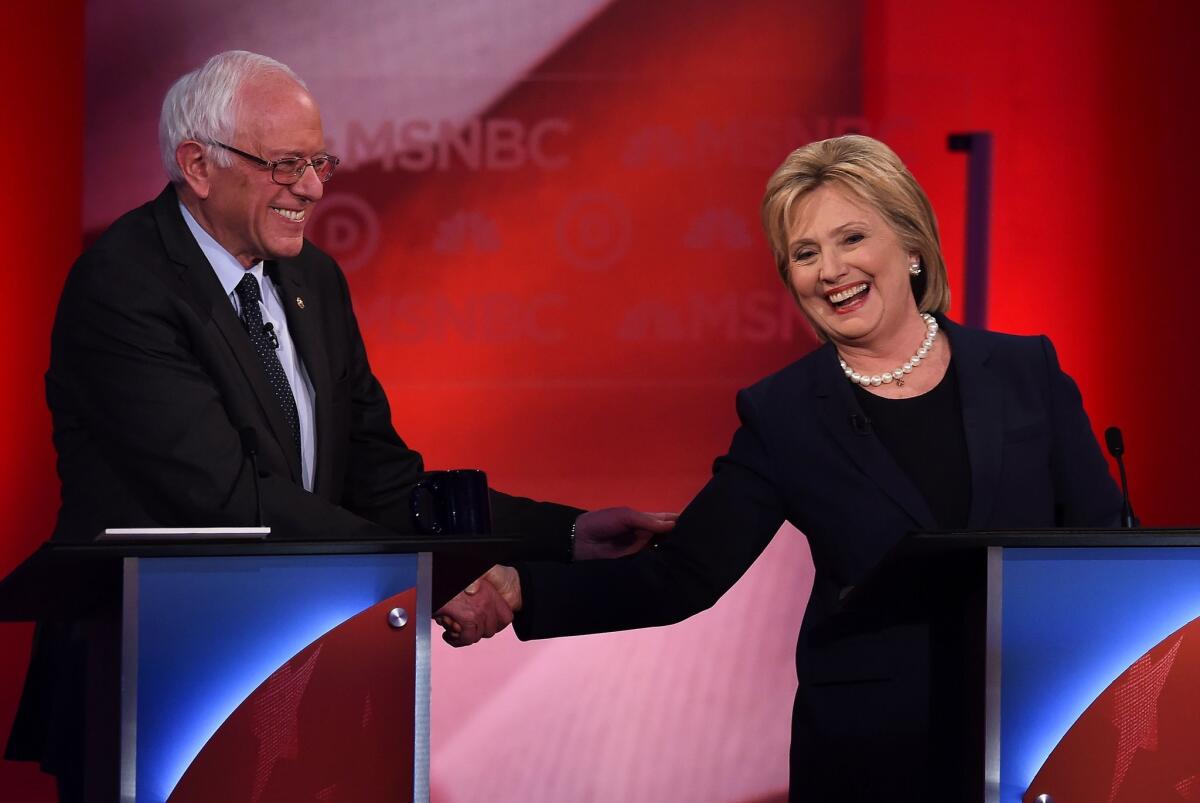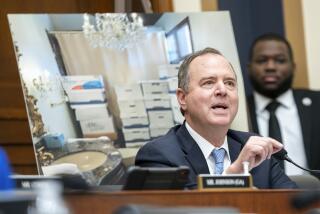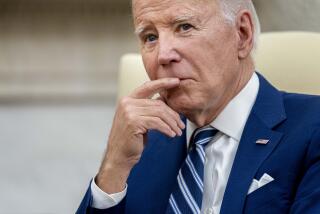Analysis: In fight between Clinton and Sanders, a raging battle over Democrats’ future

Democratic presidential candidates Bernie Sanders and Hillary Clinton during a debate Thursday at the University of New Hampshire in Durham.
Reporting from Manchester, N.H. — The Democratic presidential campaign is most obviously a fight between Hillary Clinton and Bernie Sanders. It is also a contest over what kind of party Democrats want to have and what level of purity will be required to be part of it.
The party’s leftward swing this year, made obvious by the surge of support for democratic socialist Sanders and his call for political revolution, marks a direct reversal of the party’s shift to the center in the 1990s. That lurch, engineered by Clinton’s husband Bill and his allies, moderated the party after its loss of 5-of-6 presidential campaigns from 1968 through 1988 and ushered in a period of top-of-the-ticket Democratic dominance and, for a time, control of Congress.
Clinton’s response to Sanders’ strength has been to put forward her own brand of pragmatic liberalism and to insist that her plans are more achievable given Republican strength on Capitol Hill and a deeply-divided country. That is a less-than-satisfying response for many Democrats who want to seize on this campaign to pick a nominee who reflects the party’s more-liberal present and not its moderate past.
TRAIL GUIDE: All the latest news on the 2016 presidential campaign >>
Both Sanders and Clinton are riding the impact of increased partisanship and polarization in the country, the same factors that have forced Republicans through internal bloodbaths.
A Gallup survey released earlier this year showed the growth of more ideological wings in both parties. Among Democrats, 45% identified themselves as liberal, up 6 points since 2011 and 16 points since 2000. The change has been driven in large part by a growing minority vote and the increasing youth of the party.
Republicans’ growing pains were the mirror image, with self-identified conservatives growing to 68% of the party, up 6 points since 2000.
The fight over what defines a Democrat will spark repercussions throughout the presidential race and into the general election, for the different answers suggest vastly different paths to the presidency.
Sanders’ view is that by drawing enthusiastic support he can expand turnout nationally and in the states to create a mandate for his ideas.
“Democrats win when there is a large voter turnout, when people are excited, when working people, middle-class people and young people are prepared to engage in the political process,” the Vermont senator said Thursday.
Clinton portrayed herself as the natural successor to President Obama and someone whose views would find support among both Democrats, independents and moderates who might be put off by Sanders’ inciting call.
“I believe…that I am the strongest candidate,” she said. “But what I’m concerned about is the views of many Democrats who know their states, who know how hard it is to win a general election.”
The fight between Clinton and Sanders has become tart and antagonistic in recent days as the two have battled over whether Clinton is a “progressive”, the self-definition of many of the party’s liberal voters.
In the debate, Clinton objected that Sanders was setting himself up as the “self-proclaimed gatekeeper” of the progressive wing.
“I am a progressive who gets things done,” Clinton said. “I’ve heard Senator Sanders’ comments, and it’s really caused me to wonder who’s left in the progressive wing of the Democratic Party. Under his definition, President Obama is not progressive because he took donations from Wall Street; Vice President Biden is not progressive because he supported Keystone; Sen. [Jeanne] Shaheen [of New Hampshire] is not progressive because she supports the trade pact. Even the late, great Senator Paul Wellstone [of Minnesota] would not fit this definition.”
Asked if he had established a definition of progressivism that was too narrow, Sanders said that a threshold issue was campaign finance and that candidates like Clinton, who has raised vast sums from Wall Street, didn’t pass muster. He also illustrated a contradiction when he said that Obama, who also has raised millions from Wall Street, was acceptably progressive.
Much of the dispute has taken on a personal cast. Clinton has clearly been irritated that her status in the up-and-coming segment of the Democratic party was being questioned after she suffered decades of criticism from Republicans and their conservative allies who have accused her of being too liberal. She also noted three times in the two-hour debate that she is the target of new ads paid for by hedge fund financiers—a bit of irony given Sanders’ criticism of her Wall Street ties.
Join the conversation on Facebook >>
“Every step along the way, I have stood up and fought and have the scars to prove it,” she said.
It is her history, however, that gives some Democrats pause. Her husband’s push for the North American Free Trade Agreement is still a point of dispute among opponents, particularly in organized labor, which at the time argued that American jobs would be lost. Trade—and Clinton’s more moderate views on the subject—have been one of the areas cited by Sanders when he critiques her positions.
Sanders reflects the liberal state in which he has spent his political career. Clinton has seen first hand the national tableau that for years has required a whiff of moderation for a Democratic candidate to succeed.
Bill Clinton’s 1992 campaign was greatly aided by his support for welfare reform, a centrist position that set him apart from the liberal Democratic nominees who had preceded him. President Obama had an easier task given overwhelming turnout for his 2008 election, but his trade and environmental views since have led to charges that he, like Clinton, is no progressive. And across the country, nearly all Democrats who have succeeded in winning races for governor have taken more moderate stands than Sanders.
Republicans are watching the Democratic battle with a sense of deja vu, for they have suffered through similar difficulties.
The purity challenge bedeviling Clinton has as its GOP corollary this year’s evisceration of former Florida Gov. Jeb Bush. From the time he entered the race, he has been hit for his support for legal status for immigrants in the country illegally and for his past backing of the Common Core educational standards. Until the polarizing Donald Trump entered the race, polls showed Bush was often the GOP candidate most disdained by his party’s voters.
The GOP fight has broadened recently with Texas Sen. Ted Cruz and Florida Sen. Marco Rubio trading shots on immigration, each accusing the other of being too soft on the issue.
Clinton had hoped that the Democratic version of the fratricide would be dispensed with in a swift primary season that gave her plenty of time to unite her party against the common enemy: whoever emerges as the Republican nominee.
But while Sanders has a rougher road ahead as the campaign moves to more diverse states where Clinton is stronger, he has aroused great enthusiasm among voters. He also has raised giant sums of money with relatively little effort, ensuring that his campaign—and the fight over what a Democrat should be—will endure.
For political news and analysis, follow me on Twitter: @cathleendecker . For more on politics, go to latimes.com/decker.
ALSO
Why young feminists are choosing Bernie Sanders over Hillary Clinton
Labels, smears and other takeaways from the Democratic debate
Apocalyptic campaign rhetoric amid the bucolic New Hampshire scenery
Clinton and Sanders vigorously spar in New Hampshire debate, a sign of things to come
More to Read
Get the L.A. Times Politics newsletter
Deeply reported insights into legislation, politics and policy from Sacramento, Washington and beyond. In your inbox three times per week.
You may occasionally receive promotional content from the Los Angeles Times.











